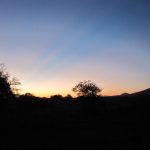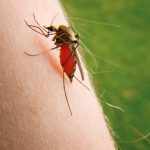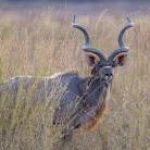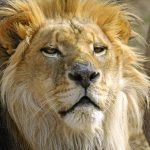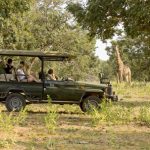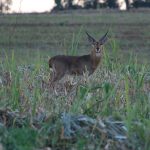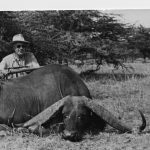Planning An African Safari
Have you thought about going to Africa, but assumed that it was too expensive, too hazardous, or too difficult? Ever since I returned from my first safari, I have been asked a number of basic questions about these and other issues by fellow hunters who are considering such a trip. If you haven’t been to Africa, the answers to these queries may surprise you.
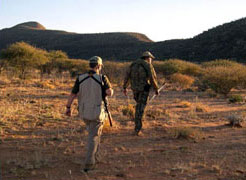
Isn’t an African safari incredibly expensive?
Depending on where you go and what you hunt, hunting journey to the Dark Continent is not nearly as expensive as you might think. I won’t pretend it’s cheap–the trophy fees, airfare, taxidermy, tips, and incidentals do add up–but an African safari is much more accessible to the average person now than it has ever been.
Most hunters choose a plains-game hunt for their first safari. These hunts typically allow a hunter to shoot a variety of antelope species–kudu, gemsbok, and impala, just to name a few–and they tend to be exciting because of the sheer variety of game available. There are usually two costs to take into consideration for such a hunt. The daily rate in many areas is quite reasonable, and it generally covers all of the expenses of a day on safari–your food, lodging, vehicle, and the services of your PH (professional hunter, or guide), tracker, and skinners.
In addition to the daily rate, every time you shoot an animal you’ll be charged a trophy fee. The trophy fees for animals I shot on my recent safari ranged from $300 for a warthog to $1,000 for a kudu. You might shoot three or four species–or a dozen or more–on a plains-game safari depending on your financial resources, your goals, and the amount of game in the area.
Many safari agents are now offering “package” hunts. These hunts incorporate the daily rate and trophy fees into one “flat” fee for the hunt–which is closer to the way we’re used to paying for guided hunts in the United States. Often, these hunts are excellent deals.
The other major costs of a safari include airfare to Africa (in my case, $2,100 round-trip from Los Angeles to Windhoek, Namibia), and the cost of packing and shipping your trophies home and the taxidermy that follows. One good thing is that if you’re taking a family member such as your spouse, your costs (other than airfare) won’t necessarily double–often, the daily rate for two people is only slightly more than for one. Many safaris are happy to accommodate a nonhunting guest for a fee.
Today it’s possible to go on an African safari and shoot half a dozen species of plains game for much less than you’d pay for a good used car. For example, Cabela’s Outdoor Adventures recently offered an African-safari package deal that included eight trophies for $4,700 (not including airfare). Many North American deer and elk hunts cost significantly more.
Isn’t Africa dangerous?
While most people no longer seriously believe they’ll be in danger of being boiled and eaten by cannibals, they do worry about political instability, terrorism, and the like. It’s one of the reasons I chose Namibia for my first hunt–it’s a safe, stable, and fairly modern country. Of course, all travel involves some risk, and every country is different, so it’s important to get up-to-date information on your destination. But the bottom line is this: Good safari operators make the safety of their clients a top priority. Clients who run into problems are unlikely to return, and that’s not good for business. You’ll probably be met by someone from your safari company as soon as you step off the plane and then whisked off to the friendly confines of your hunting area.
Good safari operators are also concerned about your health. Camps tend to be clean, and most PHs are highly trained in first aid, so if you’ve chosen your safari company wisely you should be in good hands. There is a risk of malaria in many areas, but preventative drugs will keep you safe from this disease during your hunt. Most travelers to Africa secure a prescription for an antimalarial before they leave home, and begin taking it several weeks in advance of their trip. Tell your doctor where you are planning to travel, and he or she should be able to prescribe the proper drug for you. You might also need to get a vaccination or two, although none were required for my trip to Namibia. The Centers for Disease Control and Prevention (CDCP) offer up-to-date traveler’s health advisories for most countries (cdc.gov/travel).
Of course, if you have a chronic health condition, you should check into the availability of medical care in the area you are going. Also, contact your health insurance provider to find out if your coverage applies when you are traveling abroad. If it doesn’t, you can purchase additional insurance to cover you during your trip.
Won’t I get bitten by a snake or charged by a lion?
Africa is home to a wide variety of venomous reptiles, including some of the most dangerous snakes in the world. However, most safaris are conducted during the African winter, when snakes are less active. That’s not to say that there won’t be any snakes around, but it’s extremely rare for hunters to even see a dangerous snake, much less get bitten by one.
Despite what you read, it’s also unlikely that you’ll be threatened by a big-game animal on your safari. Even hunters who are targeting these species rarely experience a charge–when they do, it is usually because a poor shot was made. Many of the areas the first-time safari hunter will visit on a plains-game hunt don’t even have lion or buffalo.
Is there anything left to hunt in Africa?
I am amazed at how many people seem to think all the animals in Africa are endangered. They’ve heard horror stories and they figure Africa is a dusty wasteland devoid of game. But in southern Africa today, thanks in a large part to game ranching and the recognition of the economic value of game and hunting, most game species–particularly the antelopes–are thriving. For an American hunter used to spotting an occasional deer or elk in a day of hunting, the variety and amount of game in Africa are impressive.
Isn’t it hard to get guns into Africa?
I was pleasantly surprised by the lack of hassle I experienced getting guns into both South Africa and Namibia (although I did experience some long waits at airports). Largely, this was the result of being well prepared.
All African countries have different regulations, and your safari operator and travel agent should be able to help you secure the proper forms and applications. Before you go, you will need to secure a signed and stamped U.S. Customs form 4457, which serves as proof of ownership of your firearms. Some countries will issue you a gun license, good for the duration of your stay, when you arrive at the airport. In other cases, you may have to fill out forms in advance so your PH can take care of the legalities for you. Be sure to ask your PH and travel agent specifically about what is required.
How do I find a reputable safari company?
This might be the most difficult question to answer, not because there aren’t any good safari companies, but because there are so many. Start your research by talking to people you know who have been there. Other good sources are North American-based booking agents who handle arrangements for African safaris; advertisements on the Web and in magazines such as Sports Afield; and places where outfitters exhibit, such as the annual conventions of Dallas Safari Club and Safari Club International and other large outdoor shows. Write or call a number of different companies for information, compare prices, ask detailed questions, and get a list of references.
What country should I hunt in?
Thirteen countries in Africa are open to big-game hunting, with more creating experimental hunting programs, but the most common destinations for first-time plains-game hunters are South Africa and Namibia. These countries have plenty of game and a large number of well-established safari operators who cater to plains-game hunters.
Do I need to buy a new rifle?
Probably not, if you’re going to be hunting only plains game. Do you have a deer rifle, especially something in the .30-caliber class? If so, and if you shoot it well, it may be the best choice for your safari rifle. The .30-06, in fact, is one of the most commonly used calibers on the continent. In many cases, even lighter rifles are acceptable. One hunter on my safari shot a dozen species–including some elk-size antelope–with his .270. It’s worth noting that this hunter was careful about his shot placement and loaded the rifle with premium bullets.
How will I get my trophies home?
Your safari company should be set up to handle the nuts and bolts of preserving your trophies and having them shipped to you after the safari is over. Again, this is something you should ask your PH when you set up the hunt. If you decide to have your trophies shipped to a taxidermist in the U.S.A., you’ll probably have to pay a fee to a taxidermist in Africa who will salt and preserve the heads and hides and crate them for shipping. When they arrive in this country, you’ll have to pay for the shipping and see that they get to your taxidermist for final preparation. You’ll probably want to hire a customs broker to help you through this process–for a fee, they’ll take care of all of the paperwork and hassles. The other option is to leave your trophies with a taxidermist in Africa and have the completed mounts shipped to you. Consult your safari operator for recommendations.
Where can I get more information about going to Africa?
An excellent basic book on this subject is Safari Guide II, which examines all facets of African hunting country by country. Other books on specific safari-planning topics include Safari Rifles II by Craig Boddington, which is the ultimate guide to choosing the right gun for your trip; and The Perfect Shot by Kevin Robertson, which tells you how to make well-placed shots on animals you may have never seen before. All of these books are available from Safari Press: 800/451-4788 or www.safaripress.com.

